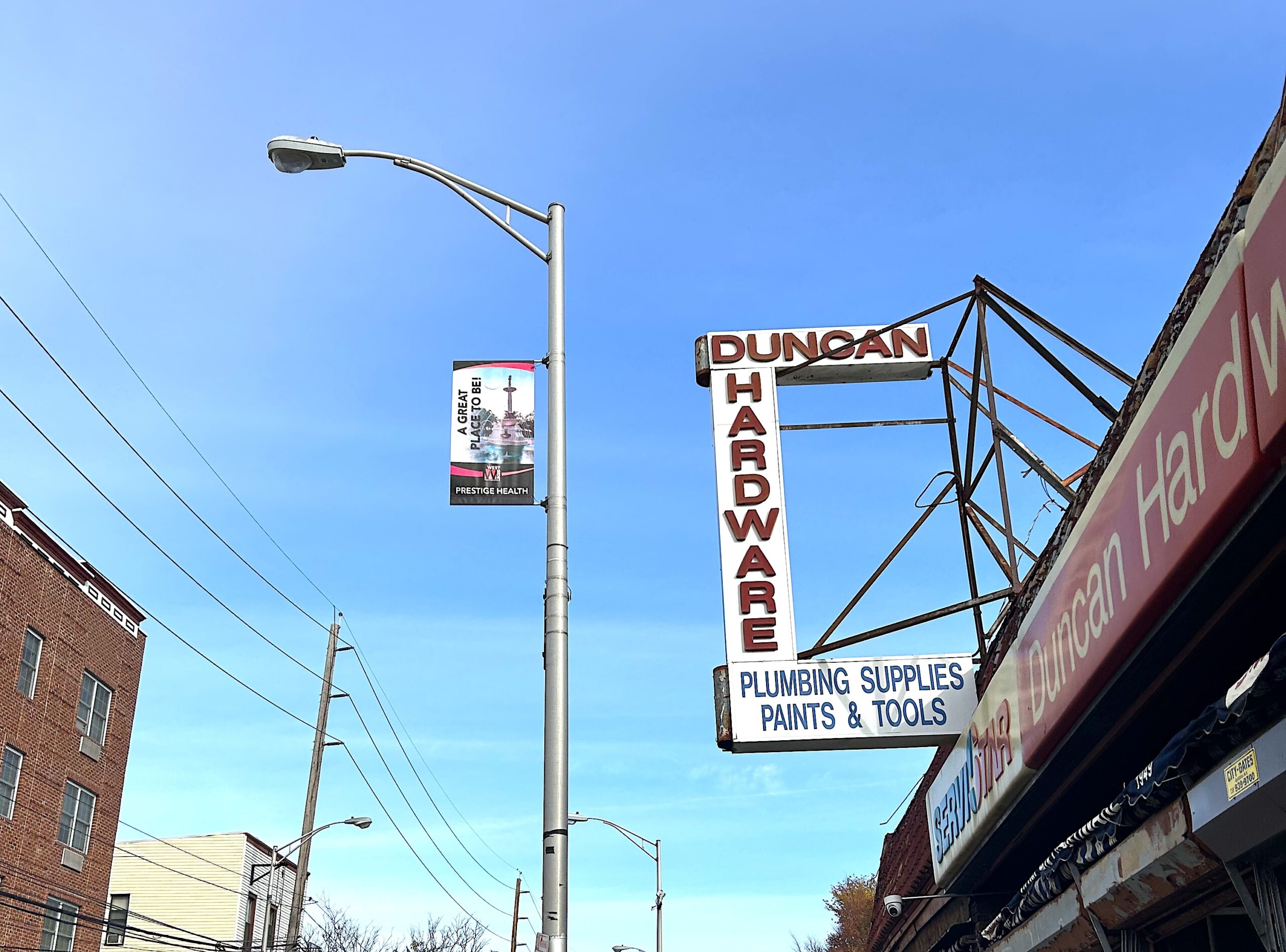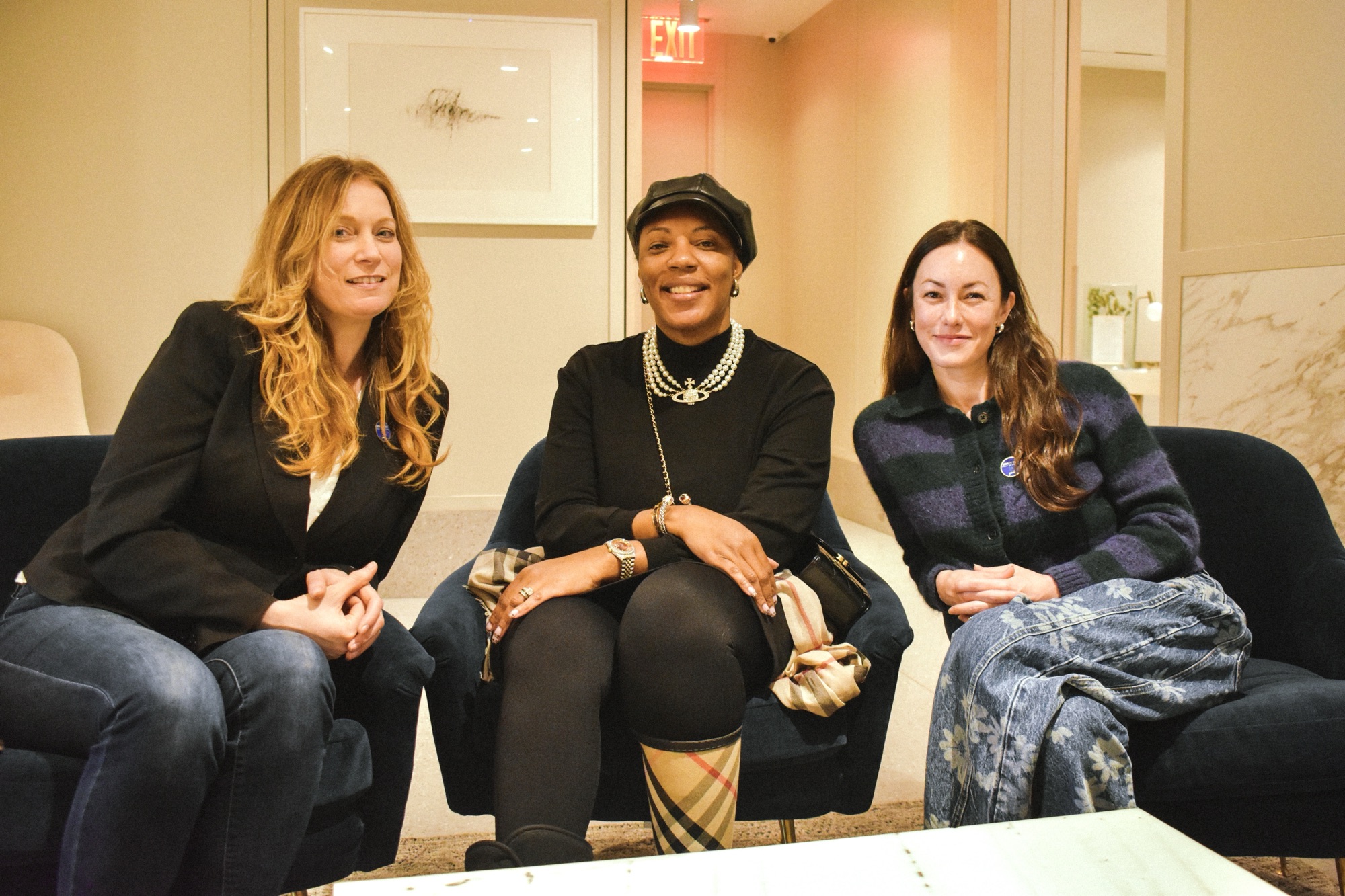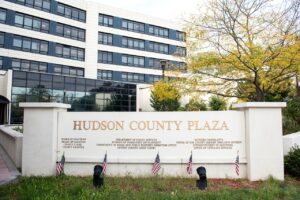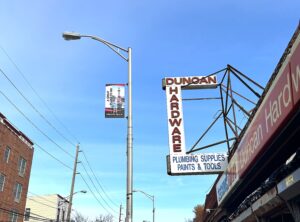Photo courtesy of Michael Dempsey / For The Jersey Journal.
Before the creation of the McGinley Square Community Board, this group of neighbors were just that–neighbors.
Situated on Glenwood Avenue–between John F. Kennedy Boulevard and West Side Avenue in Jersey City–they’d smile and wave at each other, but it wasn’t much more than that. Then one day, last March, these neighbors started getting letters in the mail about different developments that were happening on their one-way street. Suddenly, they sensed like they were “under attack.”
Under pressure, they felt they had to do something. So, the McGinley Square Community Board (MSCB) was born. Shirin MacCormack holds the title as Board President and Sondra Riley as active Board Member.
MSCB told Slice of Culture that they advocate for “sensible” development that respects neighborhoods and expressed the importance of “weaving” new stories with the old.
“If you listen, these houses whisper. These old buildings whisper of the stories of the past. So it’s a really exciting and interesting way to connect where we are now with the past and with where we’re heading,” MacCormack added.
The Controversial Decision
MCSB started within Glenwood Avenue’s “enclave,” a word MacCormack used to describe the row of historic 1895 Queen-Anne style homes, known as the Mayhew Terrace Cottages. The cottages were originally from 120 to 130 Glenwood Ave. Riley lives in the second historic home while MacCormack resides in the sixth.
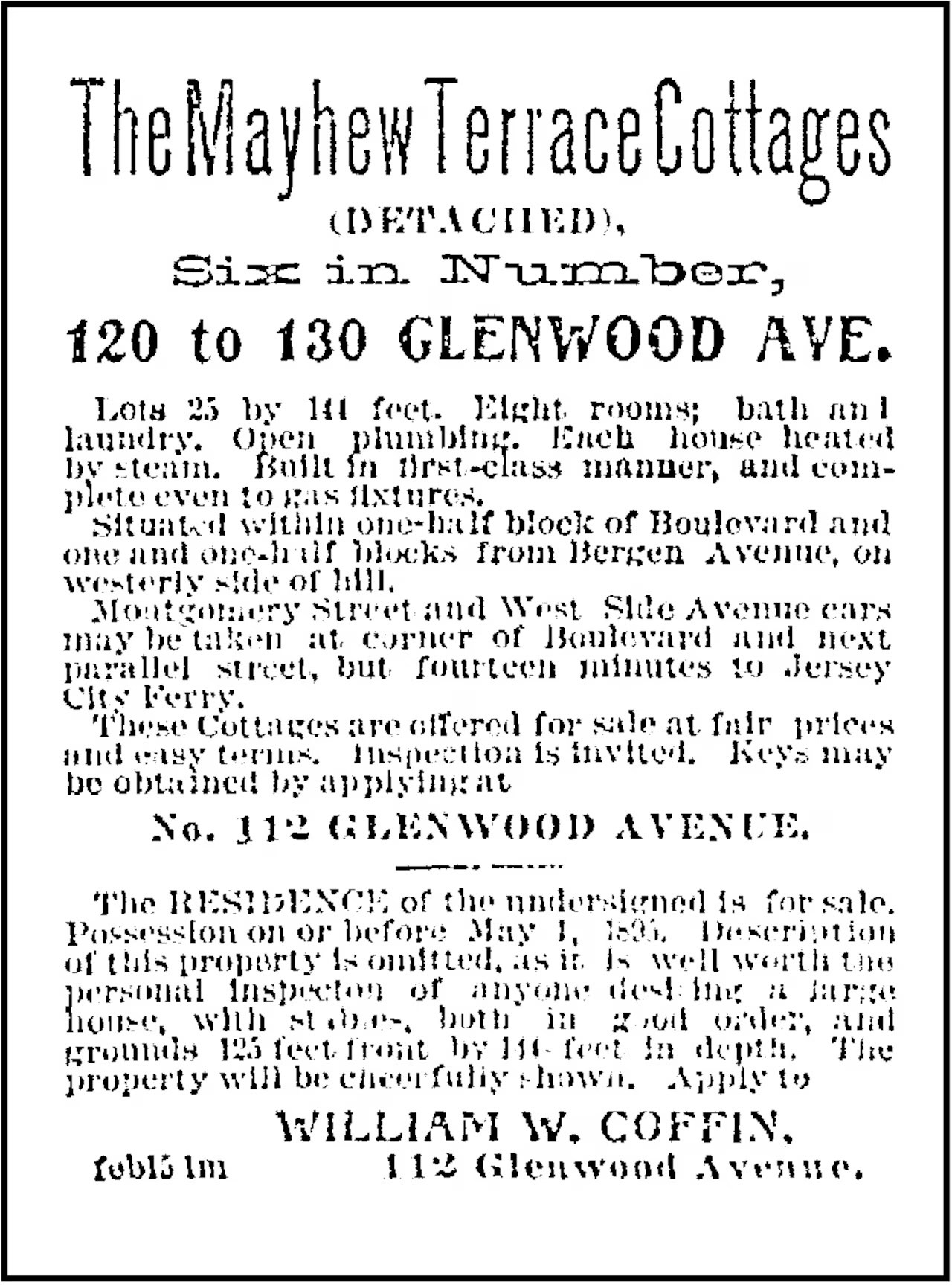
It was in mid-March of 2023 that some neighbors beginning getting letters from developers about their two four-story, four-unit building plans for 124 and 128 Glenwood Avenue. 124 Glenwood was demolished in an “irresponsible manner,” Pam Andes, an aide to Ward C Councilman Rich Boggiano previously said. Meanwhile, 128 Glenwood has served as a green space and community garden for over 20 years. Both spaces were previously owned by Saint Peter’s University, which is located right across the street, but it now belongs to Moshe Sugar, a Jersey City developer.
MacCormack told Slice of Culture that it took “a lot” of doorbells to gather a group–ringing everyone on Glenwood Avenue and the next block on Highland Avenue–but she said she knew it needed to be done.
Determined to preserve the enclave’s history as well as be cognizant of what made sense for the neighborhood, MCSB showed up at the hearing with about 12 people for the developer’s plan before the Jersey City Zoning Board and made their concerns heard. In July 2023, the developer’s plans for 124 Glenwood were denied, but was then–unexpectedly–reversed and approved in October on the basis of the zoning of 124.
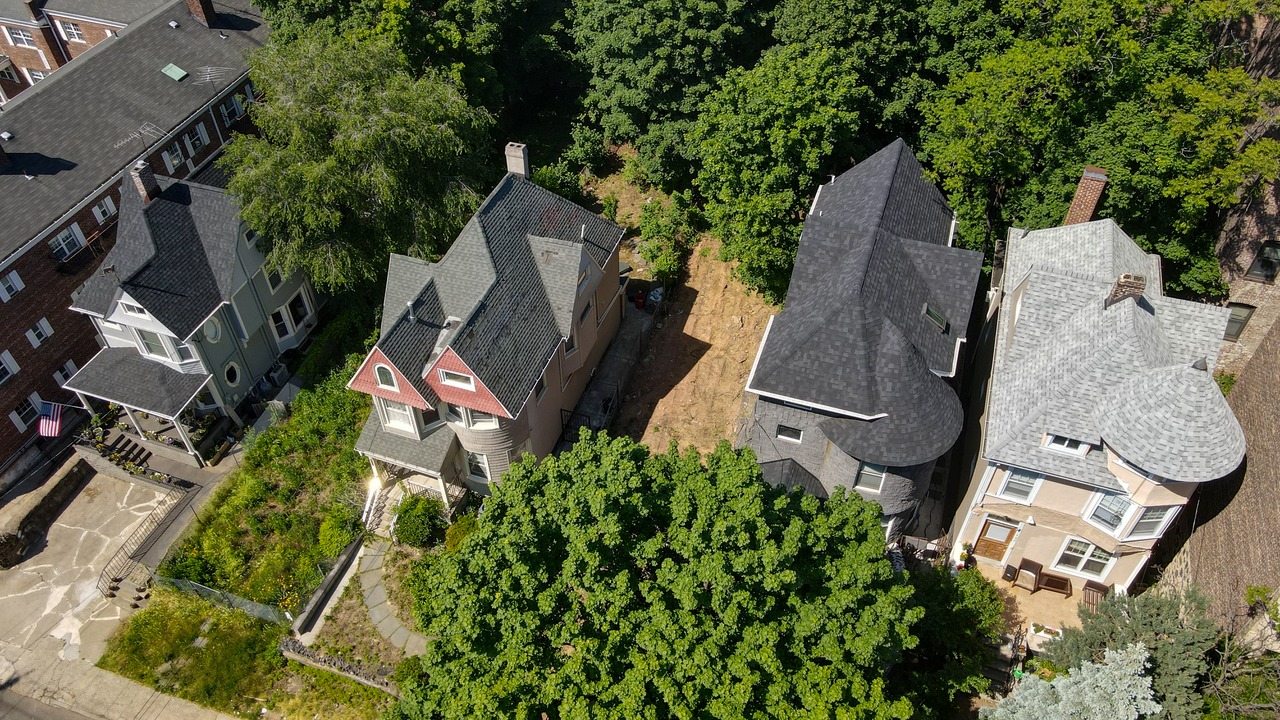
124 Glenwood sits on an R-3 zone, which means multi-family, mid-rise homes are legally allowed to be built there. This wasn’t always the case, but it was reportedly upzoned in the early 2000s–which is something that Riley’s family, who has lived there for six decades, was not aware of. The neighboring streets, however, like Highland and Montgomery Avenues, are in an R-1 zone, which only allows one- to two-family housing; this is the zone that MacCormack and Riley were under the impression of for 124 Glenwood.
Who Cares About History?
While plans for a four-story, four-unit building is underway for 124 Glenwood Avenue, MSCB continues to fight to preserve 128 Glenwood, which remains on the agenda for the city’s zoning board.
In February of this year, MCSB and the community nabbed a “win” when the city’s zoning board unanimously voted against Moshe Sugar’s four-story building plans for 128 Glenwood. In a statement on Instagram, MSCB acknowledged that it could be considered a “win,” but they see it more as an opportunity.
“We see an opportunity now for a creative collaborative solution that all can work towards, one that will benefit everyone. We look forward to a project that takes care to include community vision. That’s the “team work” that we aspire for and that would entail a true success. We CAN do better, together,” the post read.
MSCB continues to wait for the next hearing for 128 Glenwood Avenue at the time of this writing.
Historic preservation versus new development has been an ongoing concern for many of Jersey City’s residents over the last two decades or so, but especially in the last few years.
Whether it be the long-fought battle to keep the iconic Loew’s Theater; Jersey City’s plans to seize 50 Journal Square to revamp the area; or the recent transformation of Stuyvesant Liquors into New Jersey-chain company Playa Bowls, longtime establishments seem to be continuously viewed as prime real estate for developers.
However, there are organizations in place within the city to help give communities a chance to give their input.
The city of Jersey City established the Historic Preservation Commission in 2001 as part of the Land Development Ordinance. This commission identifies, records and protects buildings, structures, places and more of significant historical and architectural value. There’s also a Historic Preservation Plan that asks for community input with stakeholders.
Before that, the Jersey City Landmarks Conservancy (JCLC) was founded in 1999. This nonprofit corporation kicked off with a campaign of the 1908 Hudson and Manhattan Railroad Powerhouse, which is located downtown and helps run the entire PATH system. Last year, it was approved to be modernized with updated functions as well as electrical and mechanical equipment.
Since 1999, JCLC continues to report on historical landmarks or objects and has also worked together with locals, including MSCB. On Oct. 23, 2023, JCLC released their first “Oral Histories” film with an interview of India N. Edwards, who was 104 years old and recounted her memories of being born and raised in Jersey City; she is the late mother of Riley, MSCB’s board member. The film helped raise public awareness for MSCB’s situation on Glenwood Avenue, but also gave Edwards a “celebration” of her life, MacCormack said.
The film was honored by the city in a proclamation.
But why preserve history?
Riley and MacCormack emphasized that it shows how we got here.
“Historical buildings are so attached to who we are, our history, our culture, our soul,” Riley said. “It’s like when you walk into an old church and you get the sense of reverence because it stood the test of time and it’s meant so much to so many people over the years.”
“Preservation matters because it is a window into, or a portal into our history, and it’s our history. New Jersey is one of the first 13 colonies, so we go back to these periods of time with the waves of immigrants that were moving here. And when you have places that you can learn about that still exist, it makes it more real,” MacCormack added.
But when neighborhoods are able to mix history with the new, they get something more special.
“If you ever walk through [Holy Name Cemetary] at the bottom of the block, you feel that, in a way, you’re going through different layers of history and different waves of immigrants. Like you can see who is coming at different periods… it becomes a history tour… And it’s really a fabric, a textural weaving of different cultures and different stories here that matter,” MacCormack added.
MSCB’s Next Agenda
MacCormack also explained that MSCB is not against development, but instead advocates for “sensible” development, and preserving historic homes or buildings is a part of that.
“We want development that mirrors the neighborhood that doesn’t transform the neighborhood into something that it is not,” she added.
“… We do not wanna see vacant buildings on our block, but we do appreciate adaptive reuse of a historic neighborhood like ours… Architecture of sustainability of the residents who call this place home.”
MSCB has helped inform and include more residents in conversations with developers by hosting a number of virtual meetings. Their most recent was on May 9, which addressed parking requirements for four former Saint Peter’s dormitories at 104, 137-140 and 146-152 Glenwood Avenues as well as 850 West Side Avenue. The developer was “agreeable” to a number of community requests.
“I was actually kind of grateful to the developer for creating this problem [124 and 128 Glenwood Ave.] that we had to solve,” Riley laughed. “Because it forced us to join together in solidarity with our neighbors and get to know them and get to know other neighborhood groups and get to act and and really see the results of our hard work and raising our voices.”
But aside from holding developers accountable, the group that was formed under adversity–“in the face of development”–can also now expand their focus on other community initiatives.
MSCB works in collaboration with West Side Community Alliance and Lincoln Park North Neighborhood Association, to name a couple, to host free and public events like their recent Mother’s Day Paint and Plant and neighborhood cleanups. They also help promote other local events like Saturday’s George Floyd Remembrance Day at Berry Lane Park that will offer free hot dogs, health resources, activities and art and dance therapy.
As for community building, MacCormack and Riley emphasized the strength in numbers.
“There’s power in your voice. There’s power in community, and we’ve experienced the results of it,” Riley said.
“There’s unity in community,” MacCormack continued.
“… When we educate ourselves and we connect with each other, we find ourselves empowered… part of [MSCB’s] goal is preservation, but the other part is improving things that we’d like to change. If people find that safety is an issue, or street cleanliness is an issue, or the sidewalks are cracked, or there’s exposed wires… [MSCB is] set up to talk to the right people and make those positive changes.”
MSCB is open to all to join, including non-Jersey City residents.
Without you, there is no Slice of Culture. Any type of donation helps continue our mission of supporting aspiring journalists and keeping local journalism alive. Make a donation today

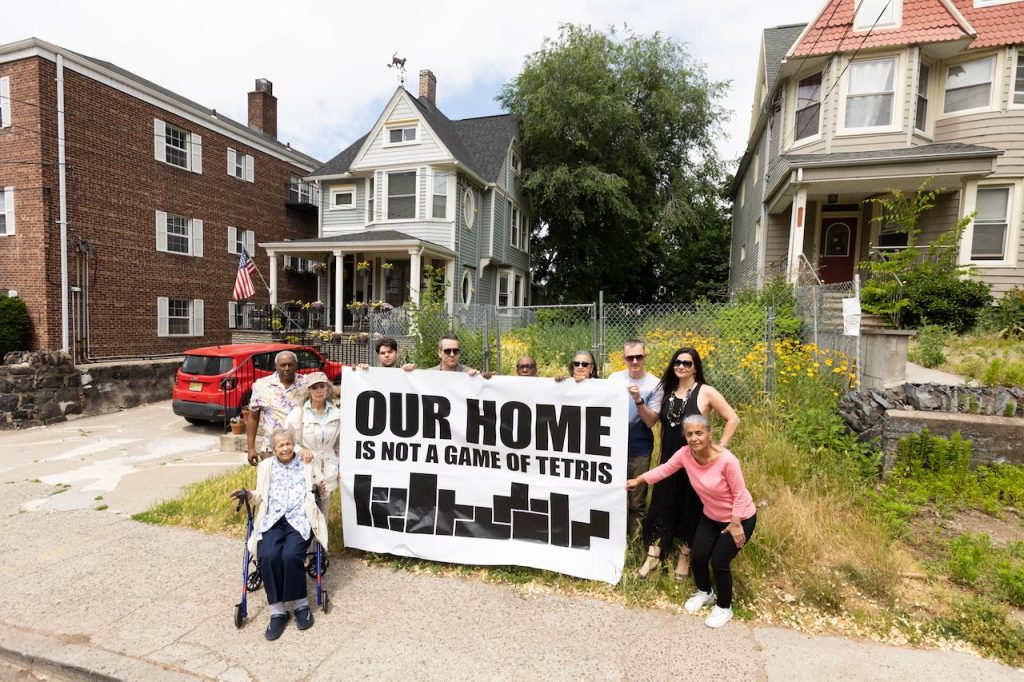


 Get your slice of culture from NJ
Get your slice of culture from NJ Hudson County born & raised
Hudson County born & raised The Locals + The Culture
The Locals + The Culture “Best Grassroots Journalism” @njspj + @njcivicinfo grantee
“Best Grassroots Journalism” @njspj + @njcivicinfo grantee





 We stopped by Excel
We stopped by Excel










 E
E







